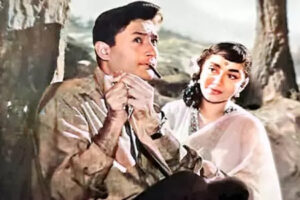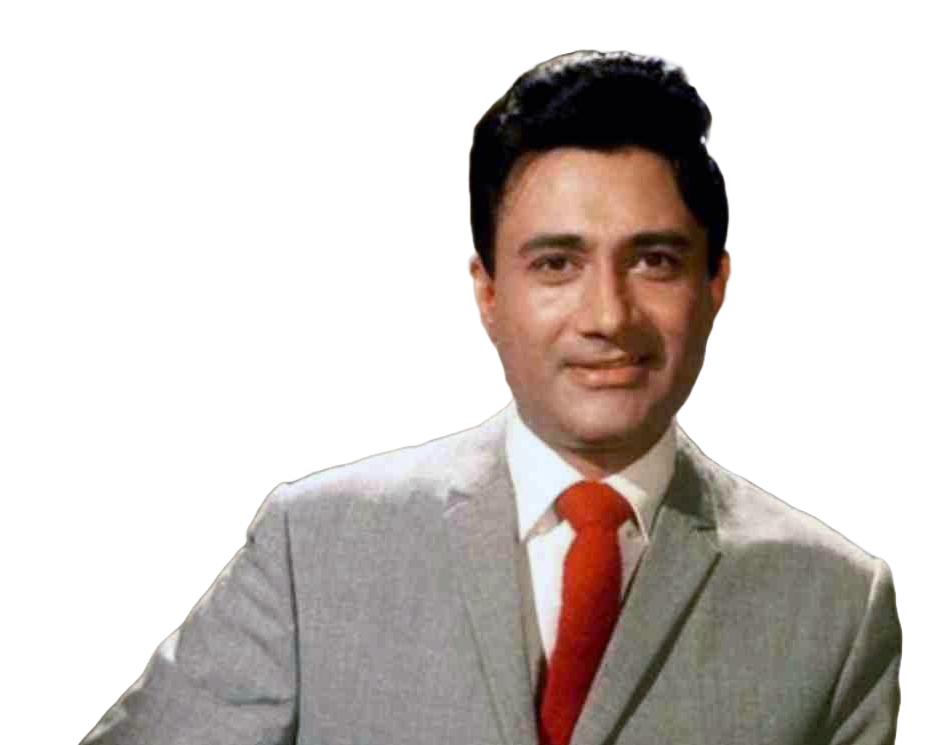India has changed post-liberalization, becoming faster and more competitive, with less time for love and romance. This indicates a rise in reason and a fading of emotion. Today, the nation, immersed in SMS culture and quick joy, prefers fast-track songs, perhaps struggling to grasp the aesthetics, culture, cinema, and music of yesteryears. Nonetheless, I celebrate the song and romance of days gone by on the 100th birth anniversary of Dev Anand, our stylish and romantic star. I analyze the beloved song “Abhi na jao chhod kar, abhi dil bhara nahin…” from “Hum Dono.” This timeless song, sung by Dev in his youth alongside the beautiful Sadhna, and penned by the stalwart Sahir Ludhianvi, showcases the softer side of his personality. Jaidev, with this song, posed questions to the music fraternity, immortalizing himself.
The song adopts a conversational style, a familiar theme among lovers. The scene unfolds with Dev Anand patiently waiting for Sadhna, who arrives slightly late. Dev playfully points at his watch, and she responds with a warm smile. The lovers sit in the garden and exchange gifts, symbolizing their deep connection. Dev tenderly ties a ribbon to her hair, symbolizing their bond, and she presents him with a musical lighter, which becomes the film’s signature tune.

As the evening darkens, Mita (Sadhna) prepares to leave, prompting Anand (Dev) to begin singing. The song comprises three stanzas, with the first sung by Rafi for Dev, the second by Asha for Sadhna, and the third with both alternating lines. The first stanza is as follows:
“Abhi na jao chhod kar ke dil abhi bhara nahi
Abhi abhi to aai ho—abhi abhi to
Abhi abhi to aai ho, bahar banake chhai ho
Hava zara mahak to le, nazar zara bahak to le
Ye sham dhal to le zara , ye dil sambhal to le zara
Mein thodi der ji to lun, nashe ke ghoont pi to lun
Abhi to kuchh kaha nahi, abhi to kuch suna nahi
Abhi na jao chhod kar ke dil abhi bhara nahi”
There is a sincere plea from Dev to Sadhna to stay a little longer, knowing very well that it was not possible considering the traditional times when young women were not expected to stay late, there is a tinge of naughtiness in the lines. He further coaxes her by saying that she has hardly been there and that she has arrived and enveloped the entire setting like the spring and therefore she should let her presence freshen and purify the air around so that his eyes could go wayward watching her all over, ‘nazar zara bahak tole’. He further cajoles her to let the evening set in and perhaps she may stay a while so that his heart ( dil ) settles a little: shaken ( zest! ) as he is with her presence. And as if his survival depends on her staying a while longer he says ‘ mein thodi deir jee to lun’ meaning that he lives only whilst she is besides him otherwise he has no life and presence and that he lives on having ‘nashen ke ghoont ’ absorbing her by his side getting intoxicated in love! And he sums up his anguish in the last lines of the stanza that how could she leave like this for they have hardly spoken to each other ‘abhi to kuch kaha nahi abhi to kuch suna nahi’, he very tactfully ignores the fact that they have spent the entire afternoon together where there was no necessity to talk, because there is no need to talk in love , but since he is a desperate lover looking for lame excuses to extend the stay he makes all flimsy but so loving moves. From the smiles that Sadhna gives it is clear that she is liking all the attention. The second stanza sung by Sadhna moves as follows:
Sitare jhilmila uthe charag jagmaga uthe
Bas ab na mujhko tokana na bhar ke raah rokana
Agar mai ruk gai abhi to jaa na paungi kabhi
Yahi kahoge tum sada ke dil abhi nahi bhara
Jo khatam ho kisi jagah ye aisa silsila nahi
Abhi nahi abhi nahi
Nahi nahi nahi nahi
Abhi na jao chhodkar ke dil abhi bhara nahi
Sadhna by now has understood that this would not be a routine parting from her lover and therefore assessing the persuasiveness of Dev she states that the stars have emerged and also the lights ( in homes and streets ) have been lit and therefore he should not interrupt her anymore (for the time beyond permissible limit has been crossed for in those times by sunset and before the darkness descended all respectable girls reached home) nor hurriedly stop her path ;and then she delivers the loveliest lines and indeed poetic, the lines which separate the sublime from ordinary ‘agar mein ruk gayi abhi to jaa na paungi kabhi vehi kaho ge tum sada ke dil abhi nahi bhara ’ implying that she would not be accepted at home if she exceeds her limits today for him, this shows her own desperation , torn that she was as a typical woman of those times between her sense of obedience to social norms and her love, she in a peculiar way taunts Dev by stating that though she would never be able to go home and he would keep insisting her to stay a while and therefore there is a subconscious hint to him to make some permanent arrangement so that they could be together for ever and in fact that is the next scene in the film in which he asks for her hand in marriage from her father. She is philosophical in these lines ‘ jo khatam ho kisi jagah ye aisa silsala nahin’ implying and imploring Dev that this was not their last meeting and that this relationship is for eternity which is not going to end at a certain place or time; she in way consoles him. The final lines are lyrical and are deftly devised to balance sermon with song and to rhyme the lines melodiously- abhi nahi abhi nahi, nahi nahi nahi nahi. The third and final stanza raises the song from the lovers banter to some serious thoughtful lines :
Adhuri aas, adhuri aas chhodke adhuri pyaas chhodke
Jo rouz yuhi jaogi to kis tarha nibhaogi
Ke zindagi ki rah mein jawan dilon ki chaah mein
Kai muquam aaenge jo ham ko aazmaenge
Bura na mano baat ka ye pyar hai gila nahi
Haan, yahi kaho ge tum sada ke dil abhi nahi bhara
Haan, dil abhi bhara nahi
Nahi nahi nahi nahi
Now Dev has realized that the regular approach will not work out and that he will have to deliver something different and more profound, because Sadhna has already stated that ‘agar mein ruk gayi abhi to ja na paungi kabhi’ so he becomes philosophical and reminds her of the responsibilities of lovers toward each other during crisis such as the present, he tells her that she was leaving him longing for her midway , his desires remain unfulfilled and if she returns everyday in such a manner leaving him discontented how will she fulfill her role as his beloved because in the path of life and the desires of young lovers there will be many moments of trials and tribulations such as the present and therefore he implies that if she was failing in her very initial test of love how will she face the many challenges ahead. However , very soon having realized that probably he has said a bit much he retracts and says in his inimitable debonair manner that all that what he said was just in ‘love’ and is not a grouse/complaint. Sadhna, who by now had turned serious smiles and the lovers make up, together repeating the lines they move hand in hand leaving the audience asking for more.
On the surface it remains a duet song, but it has been immortalized on screen by the freshness and sophistication of its two players — Dev Anand and Sadhna. The dilemma portrayed on screen is the perennial conflict of all lovers being encountered globally, the song gives voice to their unexpressed feelings and to this day whenever it is played there is universal identification . All of us have faced the same situation but could not express in the manner as enacted .And, many yearn to be in that situation in order to express to each other in the manner portrayed.







